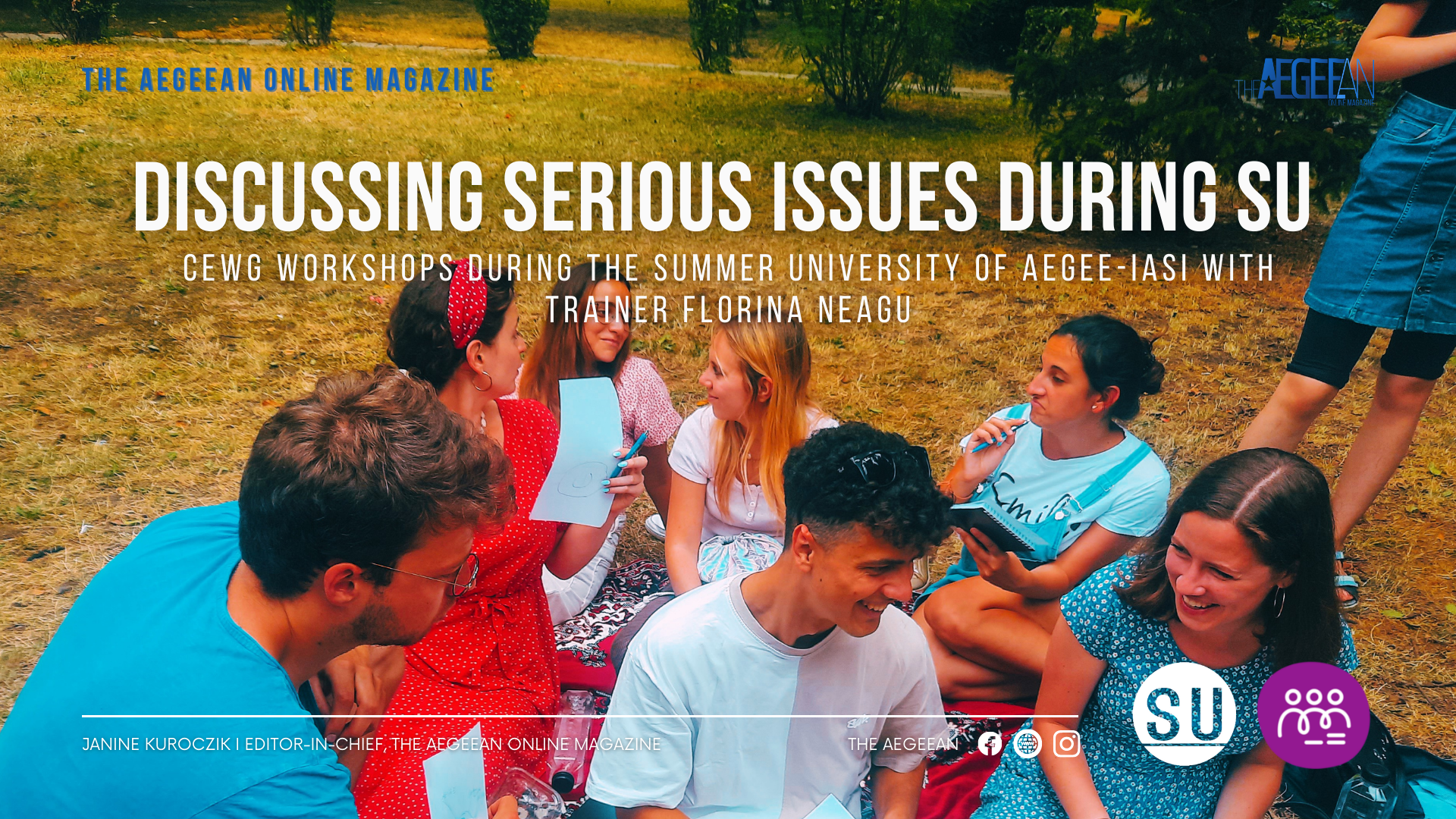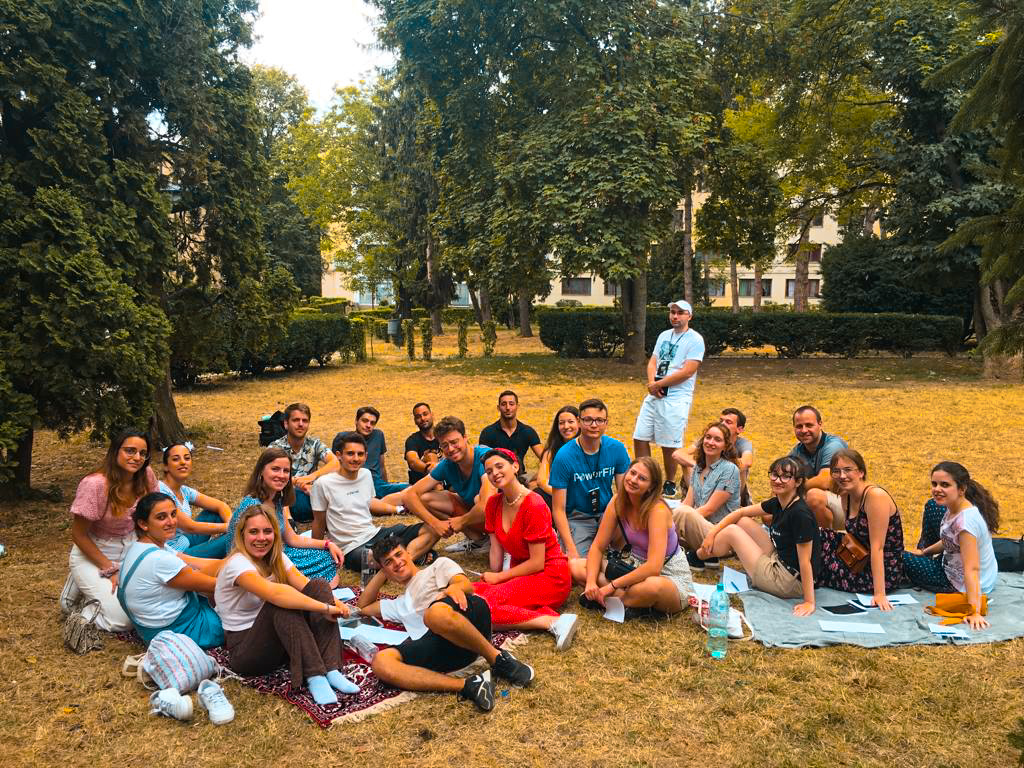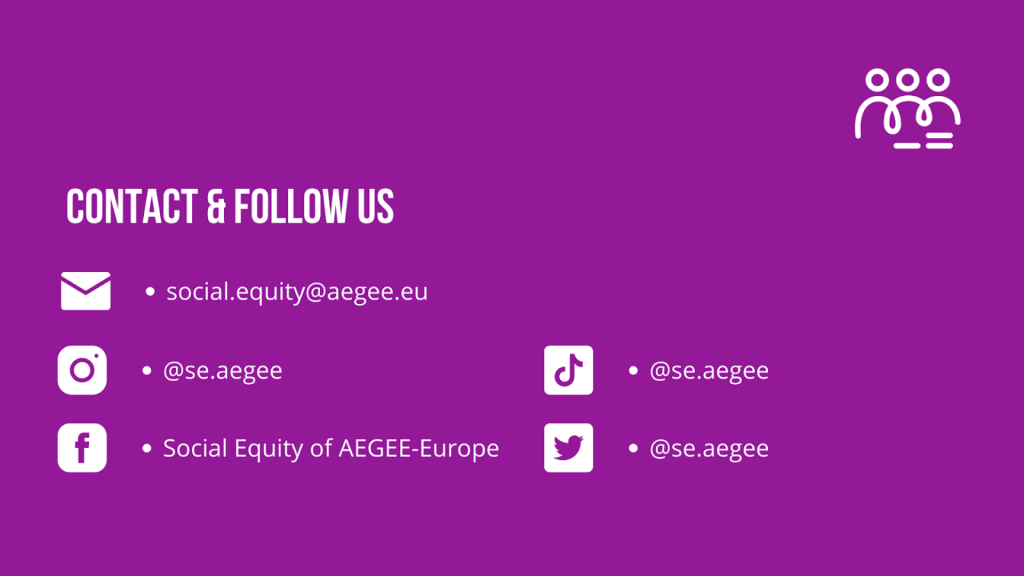As AEGEEans we all know how much fun Summer Universities are. It’s that time of the year when we all get the opportunity to explore new regions and cultures —and of course love the program and the parties that the respective antennas organise. However, SUs are also a great place to learn something new about the important issues of our time. Many of them offer thematic workshops and this year’s SU of AEGEE-Iaşi collaborated with the Social Equity Working Group to teach the participants all about social equity, refugees, discrimination and much more. Meet the SEWG-trainer Florina Neagu and find out how and why she and her team planned the workshops and how they went in the end!

Hey Florina, and thank you for answering some questions for us! First of all, can you introduce yourself and your team that created the sessions to our readers? Why did you decide to join the Summer University of AEGEE-Iaşi to hold workshops on social equity?
I’m Florina, member of AEGEE-Göteborg & AEGEE-Iaşi, and until August this year, I was the coordinator of the Social Equity Working Group. The sessions were part of the work I’ve done in the working group during the last term, together with my team, Anna Lena (AEGEE-Heidelberg), Carmen (AEGEE-Erfurt), Milica and Nevena (AEGEE-Niš), Alba (AEGEE-Alicante), Ana Isabel (AEGEE-Valladolid), and of course, Teddy, our CD-appointed member. Since the drafting of our Activity Plan, we planned to collaborate with Locals and other EBs for at least two Summer Universities and when the opportunity came, we were more than happy to help and share our materials. Being a member of AEGEE-Iaşi and involved in this SU in the previous years, I was already following their work. And due to the situation in Ukraine and the involvement of Romania in helping refugees, they approached us to talk about discrimination based on place of origin. We focused on this topic before, under Action 4 of the Action Agenda (AA), therefore we wanted to share our sessions with others.
How did you perceive the reaction of the participants to the sometimes difficult topics you were covering? Were you surprised by some of them?
I joined the working group after its creation, in 2020, and what I have learned during this time is that we are always dealing with sensitive subjects as part of our work. Moreover, we cannot always have a session with participants with the same views. It is also very common to encounter some racist or discriminatory behaviour. This is why we do what we do: try to raise awareness, educate others and ask them to reflect on their own ideas. However, I was personally surprised by this SU, because most of the participants did not know that much about the thematic focus of the event, and still, they got involved in every discussion and shared their own views. Also, I had many discussions with the participants after the session and I realised that even after it was over, they were questioning some of the things presented and reflecting on their own positions.
We had this session, for example, on what is privilege and how to recognise it, that we also delivered at the last Agora — though in this SU, we chose to change it a bit, use fictional roles and ask participants to put themselves in other people’s shoes. We tried role play because of the particularity of SUs, where people usually go to have fun and travel. However, after the session was over, I was surprised that many participants wanted to do it from their own perspectives. And this is always hard because it gets very personal when we realise how privileged we are in comparison with others. But they were so invested in this activity that they were willing to question their own position. I was there to share with them our knowledge, but in the end, I learned a lot of things from each one of them and hopefully, the working group can take it further.



How did your team prepare the workshops? Was there anything you considered as particularly important?
Our plan for this term was to have some sessions under each action of the Action Agenda, and, in this way, raise awareness about all the topics we covered this year. For big activities like a SU, we always have to keep in mind that there are multiple sessions throughout the whole event, so we try to link them. Also, not everyone is usually familiar with these topics, that’s why we start with some introductory sessions and then dive into the main topic.
For this SU, we actually combined some sessions created under Action 1, for example, about privilege, intersectionality or personal identity, as an introduction, and then we started talking about discrimination based on place of origin. We didn’t just want to present migration as a general phenomenon. We tried to bring to the discussion topics such as countering stereotypes about people with a migratory background, challenging negative narratives in the media or exploring humanitarian work on the ground. We had, for example, a collaboration with the Romanian Red Cross – Brașov Branch, where one of their volunteers shared with everyone about his experience helping Ukrainian refugees at the border. The most important thing for us in this event is what the participants can take further, practical tips about how they can tackle discrimination and negative narratives in their daily life.
During the workshops did everything go according to the plan? How did you respond to problems?
When it comes to the issues mentioned before about the overall atmosphere in the group, we try to be prepared for everything. Luckily, even when having contradictory ideas, the participants managed to keep a high level of respect for each other and had constructive debates. We always had people participating in the discussions, but maybe not everyone was interested in these topics at the beginning. So sometimes we had to adapt and let them get involved in interactive debates, rather than sharing our knowledge on the topic. We even adapted the energisers and icebreakers to link them more with the main theme of the workshop. We had to “deviate from the original script” sometimes and let them share more, so they could understand better from their own examples and discussion. We also had some problems, mainly due to organisational reasons, such as a change of venue, schedule or missing logistics. But as mentioned, I was ready for it, so I think in the end we had an amazing learning experience.

One of the sessions you presented was dealing with the issue of refugees. In these times this is a topic more pressing than ever before as people have to leave their homes because of climate change, wars, economic downturns and other factors. Is there some fact about the topic of refugees or migration that you think everyone should be aware of?
When we approach the topic of discrimination based on place of origin in our sessions, we always try to highlight that there are different types of migration, with multiple causes, and that even defining the concept of “migrant” is complicated. There is a risk nowadays of blurring the line that separates different groups of migrants, because not everyone is a refugee, and knowing the difference between them, asylum-seekers, internally displaced people and other migrants, is very important. Different groups leave their home for different reasons, and they receive protection based on their circumstances. People don’t look for refuge in other countries only because of war, but also due to other factors, as you mentioned, which are sometimes missed in the conversation about migration. We also encourage people to look beyond these labels, as they are temporary and do not reflect the whole identity of those leaving their homes. Unfortunately, nowadays, the debate on migration rarely takes into account the facts or the individual life stories of those involved. Women are rarely quoted, while information that we receive through political discourse, on social media or tv, is dominated by misinformation, sensationalism and prejudices. Everyone should always pay attention to these issues and make sure to contribute to debunking the myths and stereotypes spread through different channels.

What can we as members of AEGEE do to help people that have to leave their homes?
There is a short video from Amnesty International that we included in our sessions and that illustrates perfectly how anyone can help, no matter the resources or the country where you are coming from. We, as an organisation and individuals, most of us coming from a privileged background, have so much to offer, through different means:
- Start by getting informed, be aware of the factors that force people to leave their homes and debunk all those stereotypes used to instigate hatred and discrimination.
- Raise awareness and speak up, whether you do it on Social Media, in an activity organised by your Local, in a discussion of our working group or in a debate with decision-makers in your own city.
- Support different campaigns to help people on the move and when possible, host refugees and asylum seekers in your home or look for volunteering opportunities in your city.
Keep following the Social Equity Working Group, because the next Action Agenda has an entire action dedicated to this topic and they are planning many activities where you can get involved, individually or together with your Local!


